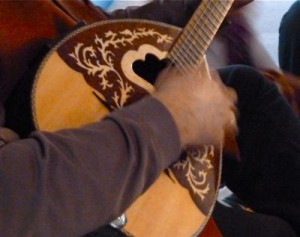Full-Spectrum Forgiveness, Part 5: Trivial or Transcendental?

Tiny incidents can cry for forgiveness as powerfully as the monumental issues we touched on in the last few posts. Trivial-seeming events make up our lives from moment to moment. When we need forgiveness we are not fully present to life.
In Post #3 of this series I mentioned two types of issues that I considered “claims against myself that called for further development of the spiritual heart”. The last two posts discussed the monumental sort. Now we start on the “trivial-seeming” set.  These issues surfaced during the spiritual retreat as I became highly sensitized to any expressions of having an ego. Ego, in this context, simply means thinking or acting in ways that separate us from others.
These issues surfaced during the spiritual retreat as I became highly sensitized to any expressions of having an ego. Ego, in this context, simply means thinking or acting in ways that separate us from others.
The retreat practices intensely sensitized my heart such that becoming somewhat annoyed with someone, being impatient, accidentally cutting line for the water dispenser, speaking at the wrong moment, and so forth caused almost physical pain in my heart center.
Whatever it is that initiates the feeling, tension can gather like sticks of wood toward a beaver dam. A busy mind may chew on an incident or event. Once we judge ourselves for some act, however trivial, evidence begins to mount, damming heart flow. Then others are treated to our closed-off self instead of the loving self that cares so much inside. Now the care itself shows up as a claim against one’s self instead of an expression of love toward other. It is not unusual for irritable people to have kind hearts inside, and to suffer from their own frustration attempting to be kind. Then the effort to be kind feeds self-blame. The dam gets bigger. Self-forgiveness frees up the flow.
No matter how trivial the trigger, it is NOT trivial when insignificant actions create distance from others. Distress mounts when we can feel not only our own separation, but blame ourselves for the discomfort of others. It is virtually impossible at times to know whether we have caused it, or whether someone’s discomfort has nothing to do with us.
With the heart fully open and sensitized this type of discomfort becomes pain. Shutting down the heart to avoid pain only leads to a greater gulf of separation. In addition to self-forgiven ess the closed heart shuts out joy, beauty, tenderness, sympathy, compassion, gratefulness and the sense of unity for which we so long. We can never beat or shame or judge ourselves into sublime emotion. Blaming ourselves for expressions of separation makes us do it more. Loveliness springs from the initially-fragile awakening of deep feeling. Self-forgiveness is key to awakening love.
ess the closed heart shuts out joy, beauty, tenderness, sympathy, compassion, gratefulness and the sense of unity for which we so long. We can never beat or shame or judge ourselves into sublime emotion. Blaming ourselves for expressions of separation makes us do it more. Loveliness springs from the initially-fragile awakening of deep feeling. Self-forgiveness is key to awakening love.
Saint Rabia said to God, “Forgive me for asking you to forgive me.” The FEELING behind this is that in direct and sublime intimacy–with the divine or any Beloved—the internal act of feeling that we must be doing some small thing wrong and wanting to be forgiven in itself creates a small measure of separation. We have assumed a separateness and distanced ourselves by not fully receiving the available love. Note that this is true in the presence of profound and mutual love. Feeling bad about something the other person has already fully embraced without a thought causes distance. Apology is called for when we shatter the closeness between us. Thinking about ourselves by trying to be perfect can distract from real love.
How and when do YOU make yourself unnecessarily separate from others?
What do you feel inside when you do it?












